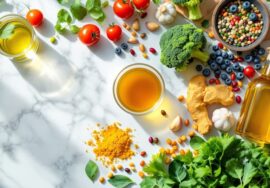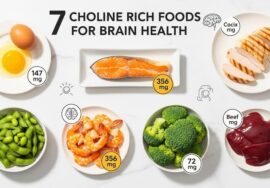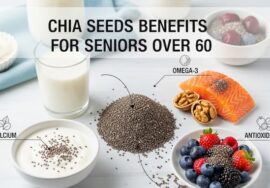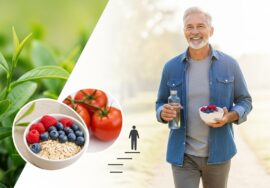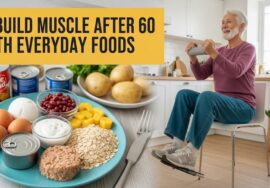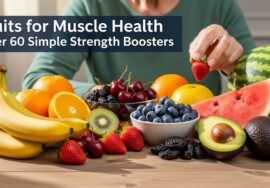Most people take their eyesight for granted—until they feel it slipping. Blurry vision, dry eyes, and trouble seeing at night are common complaints, especially as we age. But what many don’t realize is that our eyes need specific nutrients to stay sharp and healthy. Forget gimmicky eye drops and expensive supplements—real eye health starts with what you eat.
Let’s explore the most important nutrients for your eyes, how they support vision, and which foods quietly pack them in.
Table of Contents
- Why Eye Nutrition Matters More Than You Think
- Lutein and Zeaxanthin: The Blue Light Blockers
- Vitamin A: The Night Vision Vitamin
- Zinc: The Unsung Hero of Eye Health
- Vitamin C: Defense Against Cataracts
- Omega-3 Fatty Acids: For Dry, Tired Eyes
- How to Build an Eye-Healthy Meal
- Real Talk: What Happens If You Don’t Get These Nutrients?
- Frequently Asked Questions About Eye Nutrition
👁️ Why Eye Nutrition Matters More Than You Think
Your eyes are constantly exposed to light, stress, and strain. Over time, oxidative damage and inflammation can lead to serious problems like macular degeneration, cataracts, or simply feeling like your vision is “not what it used to be.” Here’s the good news: nutrients like lutein and zeaxanthin may help shield your eyes naturally.
Some people search for vitamins that strengthen retina health or foods to hydrate dry eyes—but the science shows it’s about feeding your body right from the inside out.
1. Lutein and Zeaxanthin: The Blue Light Blockers
These two plant pigments act like natural sunglasses for your eyes. They filter harmful blue light and help reduce oxidative stress in the retina.
🟢 Best Food Sources:
- Kale
- Spinach
- Egg yolks
- Yellow corn
2. Vitamin A: The Night Vision Vitamin
Struggling to see in low light? You may be low on Vitamin A. This nutrient helps form the pigment in your retina responsible for night vision and keeps your cornea moist and healthy.
🟠 Top Food Sources:
- Carrots
- Sweet potatoes
- Liver (beef or chicken)
- Butternut squash
3. Zinc: The Unsung Hero of Eye Health
Zinc helps vitamin A do its job and may slow the progression of age-related vision decline. It’s especially helpful for older adults who are beginning to notice small but steady changes in sight.
⚙️ Where to Get It:
- Pumpkin seeds
- Chickpeas
- Grass-fed beef
- Cashews
4. Vitamin C: Defense Against Cataracts
Vitamin C isn’t just for your immune system—it helps protect the lens of your eye from oxidative damage, a major cause of cataracts.
🍊 Best Sources:
- Bell peppers
- Oranges
- Kiwi
- Strawberries
5. Omega-3 Fatty Acids: For Dry, Tired Eyes
If you’re dealing with burning, itchy eyes or you stare at screens all day, omega-3s can be a game changer. They help produce tear film and reduce inflammation in the eye’s surface.
🐟 Eat These:
- Salmon
- Sardines
- Walnuts
- Chia seeds
🥗 How to Build an Eye-Healthy Meal
Want a quick example? A dinner of grilled salmon, sautéed kale, and roasted sweet potatoes hits vitamin A, omega-3s, lutein, and zinc all in one go.
Throw in a fruit salad with strawberries and kiwi, and your eyes will thank you.
Real Talk: What Happens If You Don’t Get These Nutrients?
You might not feel it right away, but over the years, poor nutrition can slowly rob you of vision. You could develop:
- Early cataracts
- Macular degeneration
- Chronic dry eyes
- Poor night vision
That’s why eye-friendly nutrition isn’t just optional—it’s essential.
👓 Frequently Asked Questions About Eye Nutrition
1. Which vitamin helps with blurred vision naturally?
Vitamin A and zinc are two key nutrients that support retinal health and help reduce blurry vision caused by nutritional deficiencies.
2. Can food really help prevent eye diseases?
Yes, antioxidants like lutein, vitamin C, and omega-3s help reduce inflammation and oxidative stress that contribute to cataracts and macular degeneration.
3. Is spinach good for eyesight?
Absolutely. Spinach is rich in lutein and zeaxanthin, which filter out harmful light and protect your retina.
4. What can I eat to avoid dry eyes?
Try including more omega-3 rich foods like salmon, chia seeds, and flaxseed oil to keep your eyes moist and reduce irritation.
5. Do supplements help if I don’t eat well?
Supplements can fill the gaps, but whole foods offer more complete nutrition with fiber and phytonutrients that work together.
Final Takeaway: See the Difference with Food First
Your eyes work hard for you every single day. Giving them the nutrients they crave isn’t complicated—it just takes a little awareness. Whether you’re trying to protect your sight as you age or improve your focus and comfort at work, these underrated vitamins and minerals could be your secret weapon.


